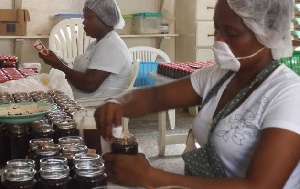The Director of Research and Projects of the Ghana Employers Association (GEA), Mr. Charles Asante-Bempong says the urgent review of the country’s Copy Right Law Act 690, 2005 will save and protect firms from collapsing in the country as the current law does not provide severe punitive measures for individuals who steal or copy others’ inventions or creations.
“The law is not stringent enough to deter counterfeits and pirates from engaging in the counterfeiting business. When one is convicted, the copy right law proposes not less than 500 penalty units and not more than 1000 penalty units. A penalty unit is GHC12 Ghana or a term of imprisonment not more than three years. We need to revise the law going forward.
“This affects businesses because somebody invents a product and has the right to that product. And then some people copy the product and start making money out of it, it kills innovation, it kills imagination, people are not able to continue to innovate because they spend their time to innovate something and someone come and steal it or copy and go make more money than the inventor, it does not encourage people to continue, ” said Mr. Asante-Bempong during a Business Advocate panel discussion in Accra funded by Business Sector Advocacy Challenge Fund in collaboration with Ghana Journalists Association.
The discussion which focused on how to deal with counterfeiting and pirating in the textile and pharmaceutical industries in Ghana and explore the options available to combat the menace was under the topic; ‘Combating Counterfeit and Illicit Trade.’
Most counterfeit and pirated products ranging from food, drinks, pharmaceuticals and textiles are believed to be smuggled into the country through unpatrolled or unapproved border routes and the act is having serious effects on businesses and the government.
Industrialists have observed that many firms have collapsed in the country, while others are on the verge of collapse due mainly to the activities of counterfeiters and pirates. But laws such as the Copyright Act 690, 2005; the Trade Marks Act 2004, and Industrial Design Act, 2003 among others are not stringent enough to minimise or eradicate the practice in the country.
This, Mr. Asante-Bempong explained that the act deprives the livelihood of creators and innovators, and many other millions of people working in intellectual property-related sectors.
“Increasing illegal trade activities including counterfeiting on our market are badly affecting the products of domestic producers, leading to significant loss of business and jobs especially in the textile and pharmaceutical sectors,” he said.
He said counterfeit products which has affected the nation on different levels is adversely impacting on the society as well as consumers, local industry and traders, employment and job creation, government revenue, image and the reputation of the country.
The textile and garment industry, he cited used to employ over 30,000 people in the past is now employing just fewer than 3,000 due to the activities of counterfeiters who pirated Ghanaian fabrics from Asian countries and them into Ghana to sell at cheaper price.
“The local textile manufacturers are suffering. Out of five, only two are currently in operation. They are even producing under capacity because of the activities of pirating.
“When it comes to the effect on consumers, it is a big issue because if you can differentiate between a counterfeit products from a genuine one, you will be cheated as a consumer. This means that consumers are also losing monies to counterfeiting. For health, we know that health implication of using a counterfeit product. It is dangerous to our health,” Mr Asante-Bempong stated.
He confirmed the efforts being made by all the institutions including the Ministry of Trade and Industry, Ghana Standards Authority, and the Attorney General Department in addressing the counterfeiting and pirating menace in the country which are targeted at protecting local businesses.
A Senior State Attorney at the Registrar General Department, Mrs Owusua Adansi-Ofori indicated that many people think that “because we register copy right we must police it which is no. “It is the duty of the copy right owner to police it. It is not our duty to do that.
“May be what we can do is that once we give you the certificate supposing that it is textile you come for formal examination then we do the substantive examination for you.
“Afterwards you do your policing yourself. You have to be vigilant. Even when it comes to copy right you initiate process by lodging complains we have a lot of remedies in our law-civil remedies, criminal remedies and administrative remedies these are done at the copy right division.”
A Commercial Officer at the Ministry of Trade and Industry, Lawrence Osei-Boateng added: “as a nation, we suffer a lot from the activities of counterfeiting-we lose investors, potential investors who might want to invest in the textile industry. They will not be interested because of the counterfeiters”.
A Standards Officer at the Ghana Standards Authority, Maxwell Kogbe maintained that counterfeit products are mostly sometimes substandard and advised the public to be cautious about those products.
“Once the product is substandard, we will not allow it on the grounds of safety and health implications. So counterfeiting goes hand in hand with standardisation”.
Mr. Kogbe urged government to resource the Ghana Immigration Service and Customs officials at the country’s boarder post to enable them stop counterfeit goods from entering the country through the borders.
Business News of Thursday, 21 July 2016
Source: thebftonline.com
Review copyright law to protect businesses
Opinions












